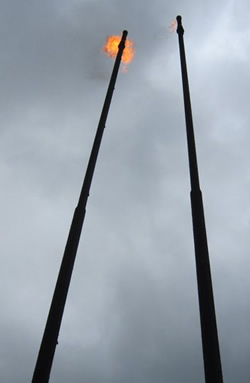Reflection for Advent 2 (Isaiah 11:1-10)
by Jennifer Henry
“The wolf shall live with the lamb,
the leopard shall lie down with the kid,
the calf and the lion and the fatling together,
and a little child shall lead them.”
Isaiah 64:1

Photo by Sara Stratton
A shoot shall come out from the stump of Jesse, and a branch shall grow out of his roots. The spirit of the LORD shall rest on him, the spirit of wisdom and understanding, the spirit of counsel and might, the spirit of knowledge and the fear of the LORD.
His delight shall be in the fear of the LORD. He shall not judge by what his eyes see, or decide by what his ears hear; but with righteousness he shall judge the poor, and decide with equity for the meek of the earth; he shall strike the earth with the rod of his mouth, and with the breath of his lips he shall kill the wicked. Righteousness shall be the belt around his waist, and faithfulness the belt around his loins.
The wolf shall live with the lamb, the leopard shall lie down with the kid, the calf and the lion and the fatling together, and a little child shall lead them. 7The cow and the bear shall graze, their young shall lie down together; and the lion shall eat straw like the ox. The nursing child shall play over the hole of the asp, and the weaned child shall put its hand on the adder’s den.
They will not hurt or destroy on all my holy mountain; for the earth will be full of the knowledge of the LORD as the waters cover the sea. On that day the root of Jesse shall stand as a signal to the peoples; the nations shall inquire of him, and his dwelling shall be glorious.
“The wolf shall live with the lamb, the leopard shall lie down with the kid, the calf and the lion and the fatling together, and a little child shall lead them.”
Isaiah 11:1-10
When my colleague Rachel first spoke of how KAIROS’ Indigenous partners in Ecuador are working towards “utopia,” I thought it was some kind of problem with translation. How, in a land where farms are interrupted by tailing ponds and gas flares, where rivers are poisoned and Indigenous people displaced by irresponsible oil extraction, how could “utopia” be the word on their lips? To my overly sensible ears, focused on achievable outcomes, this sounded a little crazy. And yet, this idea of “living utopia” is an important way they express their goals; another way, the call to “buen vivir” or “living well,” is similar. These are not words of reaction or resistance, nor are they measured, modest objectives, but rather big, generous, even audacious proposals. Communities and peoples struggling to just survive are the ones giving voice and action to dreams of thriving, vibrant futures. The vision is for fullness of life, where “human societies, as well as the natural communities – ecosystems – of which they are a part, are able to live together in harmony and to reach their full potential” (KAIROS Sustainability Discussion Paper).
In the second Sunday of Advent, in what we read as a Messianic prophecy, the Hebrew scripture offers an ancient vision of “living well.” In Isaiah 11:1-10, the prophet predicts a “utopia” where a righteous ruler brings perfect justice with perfect peace. In a gentle menagerie of wolf with lamb and leopard with kid, there is a kind of paradise of imagination. The playful coexistence of wild animal and infant child suggest humanity and creation living in sacred balance with one another. It reminds me of what I have been taught by Indigenous peoples in Canada of the concept of “all our relations.” For what was likely a post-Exilic community, it is dream of restoration, and it is a wondrous dream. Resembling the bold calls of our Ecuadoran partners, it is a vision not simply of survival but of full and generous possibility.
Some of us need a little coaching in dreaming this boldly. Overly realistic, or perhaps a little too comfortable, we can temper our own and others dreams of peace and justice for our communities or for our world. Swayed by market logic or bottom lines, some of us too readily accept “inevitable” levels of poverty or “necessary” ecological harm. We fear being labeled as foolish, impractical or unrealistic if we set our sights on what we know in our hearts to be fullness of life for all. But in this time of Advent, we are reminded that that it is God’s dreams that we are to set in front of us like a kind of horizon. And God’s dreams —righteousness, justice, peace, harmony— are bold. We must take practical, thoughtful, and sometimes what feel like terribly incremental steps forward in a specific path of justice or peace. But even as we do, we must be sure to hold on to big dreams as they are what will inspire persistence along freedom’s road. Big dreams sustain movements for change, like the ones that ended slavery, or brought down Apartheid in South Africa. Big dreams ensure we do not confuse small but important victories with the end of our faithful work for a world transformed.
God’s dreams for humanity —for all creation— are great, but great also is the promise of loving accompaniment. Emmanuel, God is with us. In this time, we both affirm and await the gift of Christ that will make all things possible.
Life giving God, in this time of Advent, may we join our dreams of peace and justice to Yours and be evangelized to action by Your audacious hope.








